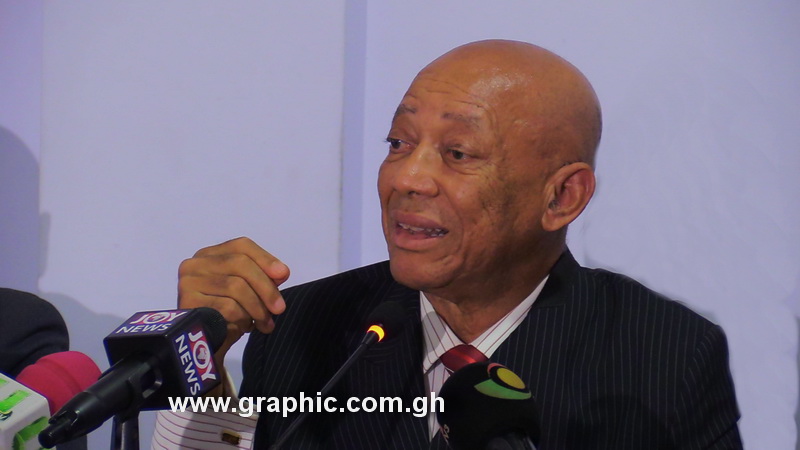
Bring former Gambian President, others to justice — Emile Short
A former Commissioner of the Commission on Human Rights and Administrative Justice (CHRAJ), Mr Justice Emile Short, has urged the government and other state and non-state actors to work together to bring to justice the former President of The Gambia and the soldiers who participated in the torture, unlawful killing and enforced disappearance of 44 Ghanaians in that country.
Such collective action, he said, would also ensure that the families of the victims were provided an effective remedy, including compensation.
Advertisement
“The survivors and the victims’ families must be supported to bring civil action against The Gambia, Yahya Jammeh, and the soldiers who participated in the killings should be brought before international or regional courts such as the ECOWAS Court of Justice in Abuja, Nigeria, and the African Courts on Human and People’s Rights in Arusha, Tanzania,” he stated.
Ghana must act now
Delivering a keynote address at a symposium to commemorate the 2019 International Human Rights Day in Accra yesterday, Mr Short said: “Ghana could also bring an action against the Gambia at the international Court of Justice (ICJ) in The Hague, Netherlands, for the ICJ to compel the Gambia to provide compensation for the survivors and victims’ families.”
The event, which was held on the theme: “Towards justice and effective remedy for Ghanaians killed in The Gambia”, brought together civil society organisations and the Chairman of the National Human Rights Commission of The Gambia, Mr Emmanuel Joof, who expressed their commitment to seek justice for the families of the murdered 44 Ghanaians.
It also attracted three survivors and the families of victims of The Gambia massacre who shared harrowing testimonies of the torture they endured in The Gambia in July 2005.
The survivors, Eric Owusu, Robert Essien and Martin Kyere, were among the 56 West African migrants, including 44 Ghanaians, who were killed by the paramilitary hit squad controlled by Yahya Jammeh on suspicion that they were mercenaries.
Government’s apathy
Mr Short, who was a judge at the International Criminal Tribunal for Rwanda, said following the events in The Gambia, particularly the testimonies at the ongoing Gambia Truth, Reconciliation and Reparations Commission (TRRC), there was no doubt about the actual perpetrators of the torture and unlawful killing of the 44 Ghanaians.
He said at the TRRC hearings on July 23, 2019, two Gambian soldiers working for a hit squad controlled by Yahya Jammeh admitted to participating in the execution of the 56 migrants on orders of Jammeh.
“Lieutenant Malick Jatt and Corporal Omar A. Jallow revealed to the TRRC that the migrants were executed by the Junglers squad, a paramilitary force that took orders from Jammeh, across The Gambian border in Senegalese territory,” he said.
He argued that regrettably, The Gambia, which first had a responsibility to ensure the torture, unlawful killing and enforced disappearance did not occur in its territory and to bring the perpetrators to justice if such crimes occurred in its territory, released the perpetrators after their testimony at the TRRC.
“And to this day, the self-confessed perpetrators are walking free in The Gambia while Yahya Jammeh is living comfortably in the Equatorial Guinea, where he has been since January 2017 after losing an election.
“Similarly, the government of Ghana has not taken any meaningful action towards seeking justice for our citizens and ensuring that the victims and their families are provided an effective remedy by the government of The Gambia,” he said.
Jurisdiction of Ghana courts
He highlighted various legal options the government could pursue to cause Yahya Jammeh and his soldiers to face justice as well as bring justice to the families of the murdered Ghanaians.
In his view, courts of Ghana had criminal jurisdiction over the murder of the 44 Ghanaians even though they were committed in The Gambia.
The acts meet the definition of enforced disappearance both under the international law and under the Ghana Criminal Offences Act as amended in 2012 to include the crime of enforced disappearance.
Time for justice
Mr Joof, on behalf of the government of The Gambia, offered sincere apologies for the massacre of the 44 Ghanaians, saying that the people who committed the atrocity “did not represent us and they did not represent openness and freedom of the Gambians.”
He expressed worry that in spite of new evidence emerging from those who took part in the killing of the Ghanaians, The Gambia and the government of Ghana had refused to release the full report on the killing after 11 years.
He, therefore, called for those who perpetrated the horrendous murder to be made to face justice immediately.